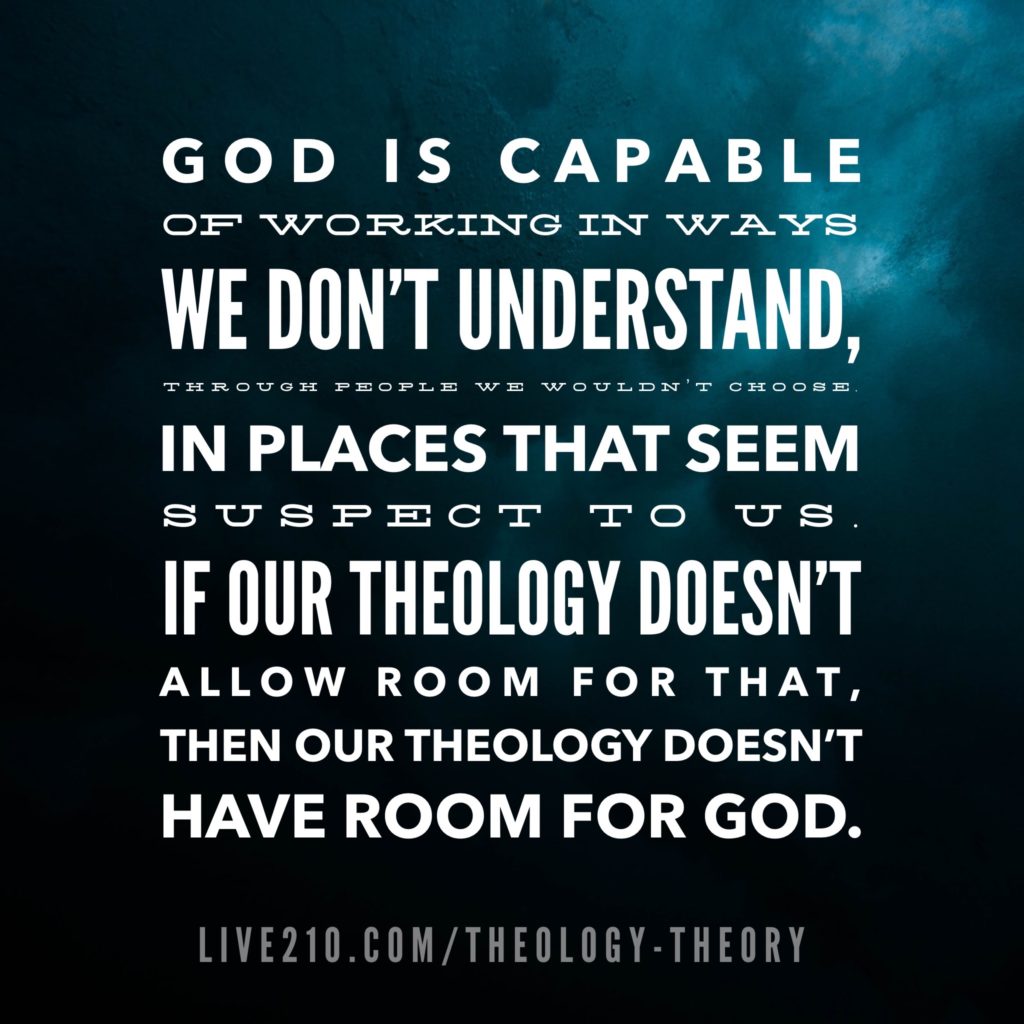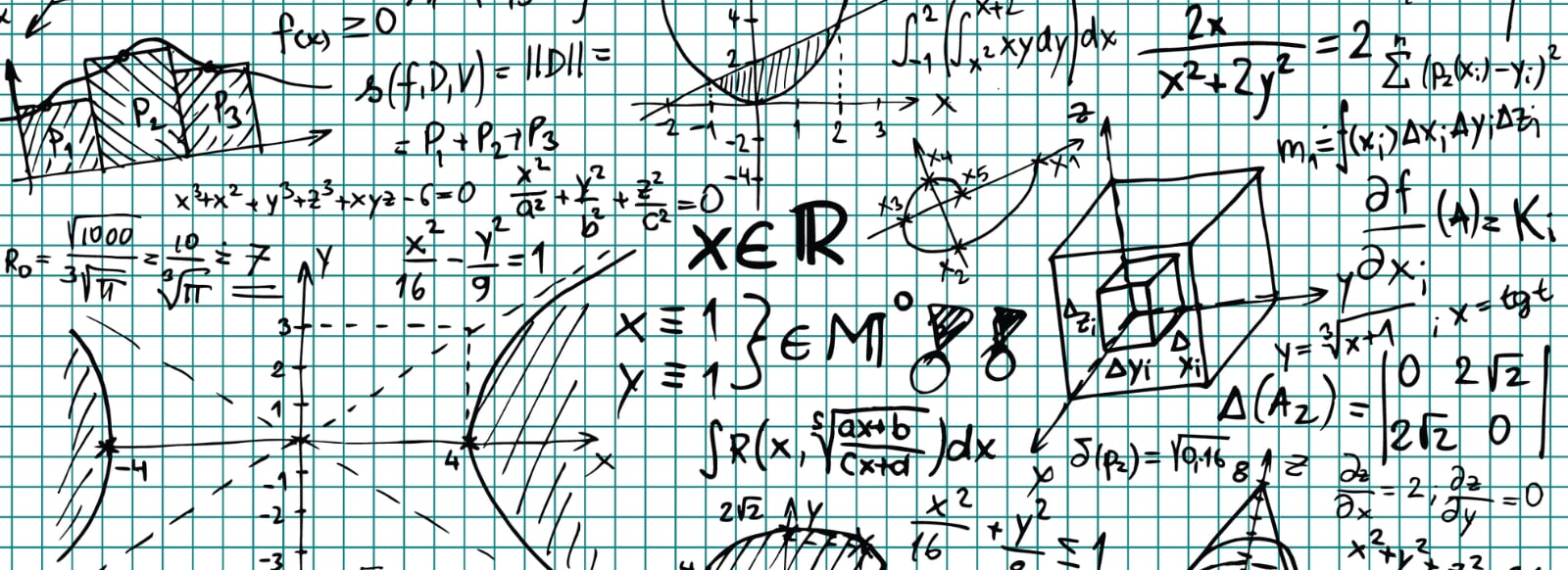5 min. to read.
Your theology is just a theory. No matter how precious. Even when you can back up each clause with scripture, or appeal to your favorite theologian.
Are you balking already? Maybe you’re sure your theology the very truth handed down from the apostles. A lot of us think that! Before you assume I’m telling you your theology isn’t right, pause a moment.
There’s a reason why this matters.
Our theology is a theory we hold about God. We’ve built this theory throughout our lives from an odd parts pile. Some blocks are scripture and interpretations of scriptures. Others come from books and sermons. Still more come from the way our parents and pastors treated us and talked to us about God when we were young. Our experiences with pain and disappointment influenced how we assembled these parts. There’s probably even some of the Holy Spirit’s work in there too.
This theory gives us a way to understand how God sees us and the world. It frames our response to big questions. What’s God’s will? Why is there evil? Why doesn’t God seem to show up when life feels desperate. This theory shapes how we understand prayer. It influences our thoughts on morality, life change, and what happens after we die.
But understand, no matter how much you trust the different parts you’ve built this theory from, the final edifice is still a theory. In the scientific world, a theory is a supposition intended to explain something observed. A theory is open to testing. That means—and this is the critical part—every theory can be adjusted. New data can change the theory.
If your theology isn’t a theory, you’re in trouble.
I don’t mean to be rude or condescending when I say this. It’s true for me, too! This theory that we hold is our best ideas about God, but it’s not God.
Even if you’re the sort who believes the Bible is verbally inspired, infallible, and inerrant, you still can’t call your theology fact. Why? Because your theology is scripture plus interpretation. Interpretation is filtered through your life and the lives of all the scholars and theologians who have been a part of the long, historical conversation that defined the various elements that have come to play a role in your theology.
That means your theory isn’t complete or final. It’s not even 100% right! If we won’t acknowledge this, our theology itself becomes an obstacle to our spiritual growth. How?
- We come to believe our theology is precisely the truth in every way. Whether we admit it or not, this is the same as thinking we understand God fully. When we do this, we compress Ultimate Reality down into something handy and portable. The God we’re worshipping, praying to, and telling others about is no longer God at all, but a fragile imitation.
- We come to believe that the luminaries who influenced our theology were flawless. We find ourselves unwilling to consider that our theological heroes saw through a glass darkly. We end up defensive and resistant to learning new things that stretch beyond what we were given. Even things God might want to teach!
- We become brittle and sharp. We transform from being spiritually-minded people humbly seeking God to being superstitious people who use religion to protect ourselves against discomfort. We use our sacred text and practices to exclude people, to label enemies, and justify our lifestyle and choices as Godly.

Does your theology have room for growth?
All of these pitfalls mean the same thing: We close ourselves off from learning and growing. When that happens, our capacity to live in union with God vanishes.
God is infinite and sovereign. At a minimum, this means God is capable of working in ways we don’t understand, through people we wouldn’t choose, in places that seem suspect to us. If our theology doesn’t allow room for that, then our theology doesn’t have room for God.
Scripture is full of people who thought they understood God’s will and then had to recalculate when God showed up in unexpected ways. Abraham would never have left Ur. Peter would never have included Gentiles in the church. Paul would never have become an apostle and tireless advocate for Christ. That’s just three examples.
I’m not saying theology is bad. I love theology. Presently I’m working through some of the most intellectually challenging theology I’ve ever read. It forces me to think. It shapes the way I see God. It causes me to come to scripture in new ways. I love it.
But I have learned that I’m always at risk of idolizing my theology. I do theology because I love God, but without care, I can quickly come to love my theology more than I love the pursuit of God or the people around me.
Avoid that failure. Just acknowledge upfront: your theology is just a theory. So is mine. May we always be testing this theory, letting go of those parts that fail to measure up to the person of Christ, and adding to it the new things we learn as God works in our lives.

It is refreshing to hear a pastor define the difference between theology and demonstrating our faith as two different things. Things that go hand in hand, but they are not one and the same. Thank you for pointing this out!
Thank you for the blog on Theology/Theory. I often judge myself by the theology/theories of others as if others are always right (and I’m always wrong). I appreciate the new perspective – and take this away from what I read: God is greater than my understanding. That means that my understanding is always up for scrutiny and sometimes alteration. However, my understanding, until I know better (as revealed by the Holy Spirit) is my understanding…while I always remain open to learning how I, perhaps, misunderstand. My soul must remain teachable.
You’re right on the money, I think. My sense is that our pursuit to understand God is a form of worship. In the very best case, we do theology as an act of love. But there’s a real risk we run. We can turn our understanding into an “idol,” worshipping what we know, or even finding value and justification in our certainty. What may have started as an act of worship becomes another way to make ourselves right and strong. So, if we don’t have room for your idea that “God is greater than our understanding” we are moving away from God rather than toward God.
Thanks for reading and leaving a comment!
Thank you for acknowledging this reality. Several years ago a religious teacher once stated, “To truly study, (and learn) something, you first must admit that you don’t know everything. And, secondly, you must admit that everything you now know may be wrong.” That really helped me begin to let go emotionally of my childhood theology and open my heart to Spirit’s voice. I keep finding that God’s love and grace to me are real and everlasting. And the interpretation of how that is experienced has been subjected to centuries of old, fundamental, early protestant and Victorian history. God’s love is timeless and outside of the centuries of this world’s history and understanding. It is metaphysical, and as real as air…unseen but life-essential.